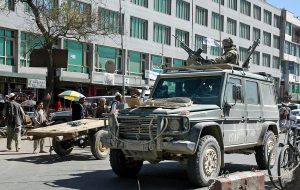Four years ago, just before the Taliban returned to power in Afghanistan, the group banned the sale of children’s toys in Kandahar province. It was a sign of the group’s draconian approach.
As the group marks its fourth year back in power, the Taliban have closed off society to Afghan women and have enforced brutal authority in a country where people have been relentlessly repressed by waves of conflict, corruption, poverty, and displacement for over four decades.
The myriad challenges in Afghanistan have compounded with the Taliban’s rule. At the moment, more than half of the population requires lifesaving assistance, according to the United Nations. Afghanistan is facing a hunger crisis, with more than one-third of the population experiencing dangerous levels of food insecurity and severe poverty affecting 90 percent of the population. This poverty is so terrible that some parents have reportedly been forced to sell their children for survival, due to economic collapse and a healthcare crisis, among other grave humanitarian challenges.
Not only that but Afghanistan ranks globally as the sixth most vulnerable country to climate change. The country has been enduring recurring climate-related disasters and faces severe water scarcity, with reports by humanitarian organizations noting that the capital, Kabul, might become the first modern city to run out of water by 2030.
Amid these catastrophic humanitarian and climate crises, Afghanistan is also facing a severe rollback of basic human rights, particularly for women and girls. The Taliban’s draconian restrictions have been contributing to increased suicide rates, especially among younger generations of Afghans. Not only have women and girls been erased from public life but they’ve also been dying as a result of the Taliban’s decrees. The Taliban’s edict requiring women to have a male chaperone to travel outside their homes has led to documented cases of women who urgently required medical attention, especially pregnant women, dying, unable to receive care in time because they weren’t able to leave their homes to seek healthcare on their own. Even more troubling, at the end of last year, the Taliban banned medical training for women, which will further harm women’s access to health care and increase maternal mortality rates across the country.
Despite the urgency of the crises in Afghanistan, the international community’s response has been fragmented and divided. This international division was on display in a recent resolution on the situation in Afghanistan adopted by the U.N. General Assembly. According to the Associated Press, the resolution calls on the Taliban to reverse their oppression of women and girls, emphasizes “the importance of creating opportunities for economic recovery, development and prosperity in Afghanistan,” and urges donors to address the country’s dire humanitarian and economic crisis.”
Key U.N. member states cast different votes, exposing the divided international response to the urgent crises unfolding in Afghanistan. The United States voted against the resolution, while its major European allies voted in favor of it, and important regional actors including China, India, Russia, and Iran abstained from voting entirely. The contrasting votes by the different stakeholders reveal the evolving policies of these countries toward Afghanistan. At a time when global unity is crucial to address the devastating crises in Afghanistan, stakeholders have remained divided. This split has only allowed the Taliban to solidify its grip on power, with little accountability and pressure from the international community.
The U.N. resolution followed Russia’s recognition of the Taliban, becoming the first country to do so. While the move highlights Russia’s rift with the West and its desire to contain the Islamic State Khorasan Province (ISKP), Russian recognition doesn’t remedy the Taliban’s isolation. Rather, it shows all the more why stakeholders need to come together to pursue one coherent strategy to address the critical challenges in Afghanistan, including the humanitarian and human rights crises, while ensuring they do not give legitimacy to the Taliban. At the same time, stakeholders should continue to push for justice and accountability through international means, including the International Criminal Court.
Four years into the Taliban regime, life for Afghans has become even more difficult, with basic aspects of daily life prohibited, while Afghanistan continues to sink deeper into crisis.
The challenges in Afghanistan are daunting, but the foremost step is for the international community to come together behind a unified strategy aimed at achieving an Afghanistan where women are free to live according to their will and where girls can play without fear of repression.

































